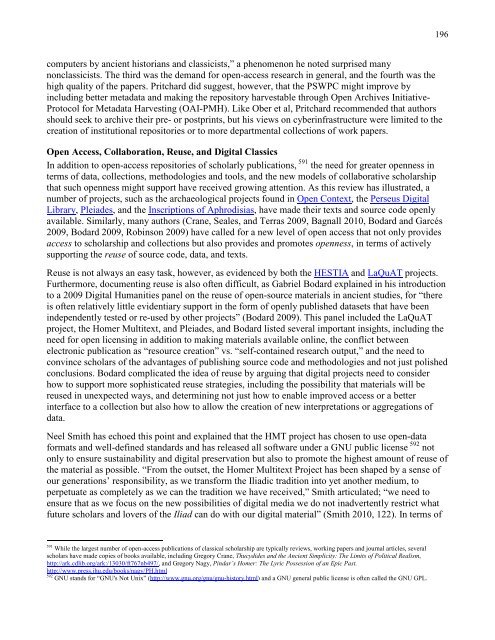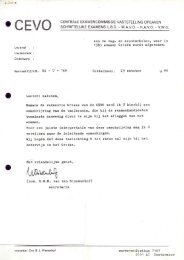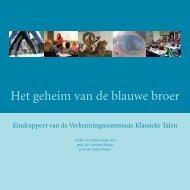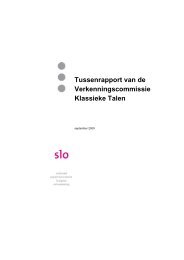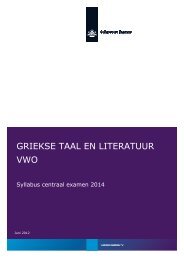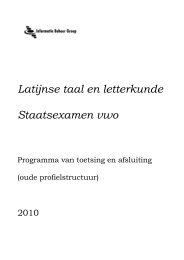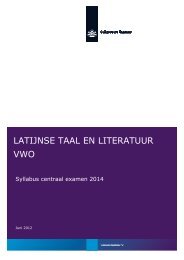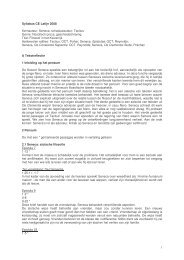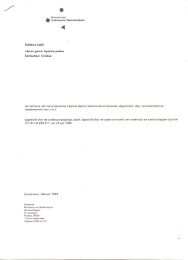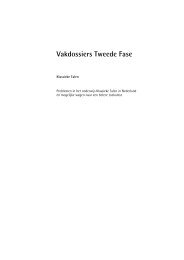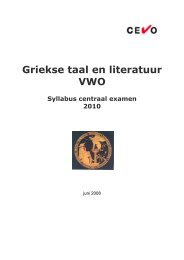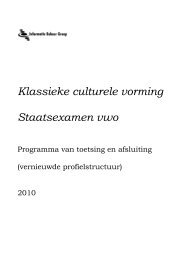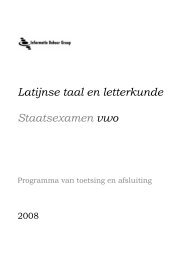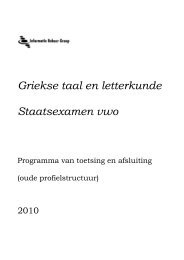Rome Wasn't Digitized in a Day - Council on Library and Information ...
Rome Wasn't Digitized in a Day - Council on Library and Information ...
Rome Wasn't Digitized in a Day - Council on Library and Information ...
Create successful ePaper yourself
Turn your PDF publications into a flip-book with our unique Google optimized e-Paper software.
196<br />
computers by ancient historians <strong>and</strong> classicists,” a phenomen<strong>on</strong> he noted surprised many<br />
n<strong>on</strong>classicists. The third was the dem<strong>and</strong> for open-access research <str<strong>on</strong>g>in</str<strong>on</strong>g> general, <strong>and</strong> the fourth was the<br />
high quality of the papers. Pritchard did suggest, however, that the PSWPC might improve by<br />
<str<strong>on</strong>g>in</str<strong>on</strong>g>clud<str<strong>on</strong>g>in</str<strong>on</strong>g>g better metadata <strong>and</strong> mak<str<strong>on</strong>g>in</str<strong>on</strong>g>g the repository harvestable through Open Archives Initiative-<br />
Protocol for Metadata Harvest<str<strong>on</strong>g>in</str<strong>on</strong>g>g (OAI-PMH). Like Ober et al, Pritchard recommended that authors<br />
should seek to archive their pre- or postpr<str<strong>on</strong>g>in</str<strong>on</strong>g>ts, but his views <strong>on</strong> cyber<str<strong>on</strong>g>in</str<strong>on</strong>g>frastructure were limited to the<br />
creati<strong>on</strong> of <str<strong>on</strong>g>in</str<strong>on</strong>g>stituti<strong>on</strong>al repositories or to more departmental collecti<strong>on</strong>s of work papers.<br />
Open Access, Collaborati<strong>on</strong>, Reuse, <strong>and</strong> Digital Classics<br />
In additi<strong>on</strong> to open-access repositories of scholarly publicati<strong>on</strong>s, 591 the need for greater openness <str<strong>on</strong>g>in</str<strong>on</strong>g><br />
terms of data, collecti<strong>on</strong>s, methodologies <strong>and</strong> tools, <strong>and</strong> the new models of collaborative scholarship<br />
that such openness might support have received grow<str<strong>on</strong>g>in</str<strong>on</strong>g>g attenti<strong>on</strong>. As this review has illustrated, a<br />
number of projects, such as the archaeological projects found <str<strong>on</strong>g>in</str<strong>on</strong>g> Open C<strong>on</strong>text, the Perseus Digital<br />
<strong>Library</strong>, Pleiades, <strong>and</strong> the Inscripti<strong>on</strong>s of Aphrodisias, have made their texts <strong>and</strong> source code openly<br />
available. Similarly, many authors (Crane, Seales, <strong>and</strong> Terras 2009, Bagnall 2010, Bodard <strong>and</strong> Garcés<br />
2009, Bodard 2009, Rob<str<strong>on</strong>g>in</str<strong>on</strong>g>s<strong>on</strong> 2009) have called for a new level of open access that not <strong>on</strong>ly provides<br />
access to scholarship <strong>and</strong> collecti<strong>on</strong>s but also provides <strong>and</strong> promotes openness, <str<strong>on</strong>g>in</str<strong>on</strong>g> terms of actively<br />
support<str<strong>on</strong>g>in</str<strong>on</strong>g>g the reuse of source code, data, <strong>and</strong> texts.<br />
Reuse is not always an easy task, however, as evidenced by both the HESTIA <strong>and</strong> LaQuAT projects.<br />
Furthermore, document<str<strong>on</strong>g>in</str<strong>on</strong>g>g reuse is also often difficult, as Gabriel Bodard expla<str<strong>on</strong>g>in</str<strong>on</strong>g>ed <str<strong>on</strong>g>in</str<strong>on</strong>g> his <str<strong>on</strong>g>in</str<strong>on</strong>g>troducti<strong>on</strong><br />
to a 2009 Digital Humanities panel <strong>on</strong> the reuse of open-source materials <str<strong>on</strong>g>in</str<strong>on</strong>g> ancient studies, for “there<br />
is often relatively little evidentiary support <str<strong>on</strong>g>in</str<strong>on</strong>g> the form of openly published datasets that have been<br />
<str<strong>on</strong>g>in</str<strong>on</strong>g>dependently tested or re-used by other projects” (Bodard 2009). This panel <str<strong>on</strong>g>in</str<strong>on</strong>g>cluded the LaQuAT<br />
project, the Homer Multitext, <strong>and</strong> Pleiades, <strong>and</strong> Bodard listed several important <str<strong>on</strong>g>in</str<strong>on</strong>g>sights, <str<strong>on</strong>g>in</str<strong>on</strong>g>clud<str<strong>on</strong>g>in</str<strong>on</strong>g>g the<br />
need for open licens<str<strong>on</strong>g>in</str<strong>on</strong>g>g <str<strong>on</strong>g>in</str<strong>on</strong>g> additi<strong>on</strong> to mak<str<strong>on</strong>g>in</str<strong>on</strong>g>g materials available <strong>on</strong>l<str<strong>on</strong>g>in</str<strong>on</strong>g>e, the c<strong>on</strong>flict between<br />
electr<strong>on</strong>ic publicati<strong>on</strong> as “resource creati<strong>on</strong>” vs. “self-c<strong>on</strong>ta<str<strong>on</strong>g>in</str<strong>on</strong>g>ed research output,” <strong>and</strong> the need to<br />
c<strong>on</strong>v<str<strong>on</strong>g>in</str<strong>on</strong>g>ce scholars of the advantages of publish<str<strong>on</strong>g>in</str<strong>on</strong>g>g source code <strong>and</strong> methodologies <strong>and</strong> not just polished<br />
c<strong>on</strong>clusi<strong>on</strong>s. Bodard complicated the idea of reuse by argu<str<strong>on</strong>g>in</str<strong>on</strong>g>g that digital projects need to c<strong>on</strong>sider<br />
how to support more sophisticated reuse strategies, <str<strong>on</strong>g>in</str<strong>on</strong>g>clud<str<strong>on</strong>g>in</str<strong>on</strong>g>g the possibility that materials will be<br />
reused <str<strong>on</strong>g>in</str<strong>on</strong>g> unexpected ways, <strong>and</strong> determ<str<strong>on</strong>g>in</str<strong>on</strong>g><str<strong>on</strong>g>in</str<strong>on</strong>g>g not just how to enable improved access or a better<br />
<str<strong>on</strong>g>in</str<strong>on</strong>g>terface to a collecti<strong>on</strong> but also how to allow the creati<strong>on</strong> of new <str<strong>on</strong>g>in</str<strong>on</strong>g>terpretati<strong>on</strong>s or aggregati<strong>on</strong>s of<br />
data.<br />
Neel Smith has echoed this po<str<strong>on</strong>g>in</str<strong>on</strong>g>t <strong>and</strong> expla<str<strong>on</strong>g>in</str<strong>on</strong>g>ed that the HMT project has chosen to use open-data<br />
formats <strong>and</strong> well-def<str<strong>on</strong>g>in</str<strong>on</strong>g>ed st<strong>and</strong>ards <strong>and</strong> has released all software under a GNU public license 592 not<br />
<strong>on</strong>ly to ensure susta<str<strong>on</strong>g>in</str<strong>on</strong>g>ability <strong>and</strong> digital preservati<strong>on</strong> but also to promote the highest amount of reuse of<br />
the material as possible. “From the outset, the Homer Multitext Project has been shaped by a sense of<br />
our generati<strong>on</strong>s’ resp<strong>on</strong>sibility, as we transform the Iliadic traditi<strong>on</strong> <str<strong>on</strong>g>in</str<strong>on</strong>g>to yet another medium, to<br />
perpetuate as completely as we can the traditi<strong>on</strong> we have received,” Smith articulated; “we need to<br />
ensure that as we focus <strong>on</strong> the new possibilities of digital media we do not <str<strong>on</strong>g>in</str<strong>on</strong>g>advertently restrict what<br />
future scholars <strong>and</strong> lovers of the Iliad can do with our digital material” (Smith 2010, 122). In terms of<br />
591 While the largest number of open-access publicati<strong>on</strong>s of classical scholarship are typically reviews, work<str<strong>on</strong>g>in</str<strong>on</strong>g>g papers <strong>and</strong> journal articles, several<br />
scholars have made copies of books available, <str<strong>on</strong>g>in</str<strong>on</strong>g>clud<str<strong>on</strong>g>in</str<strong>on</strong>g>g Gregory Crane, Thucydides <strong>and</strong> the Ancient Simplicity: The Limits of Political Realism,<br />
http://ark.cdlib.org/ark:/13030/ft767nb497/, <strong>and</strong> Gregory Nagy, P<str<strong>on</strong>g>in</str<strong>on</strong>g>dar’s Homer: The Lyric Possessi<strong>on</strong> of an Epic Past.<br />
http://www.press.jhu.edu/books/nagy/PH.html<br />
592 GNU st<strong>and</strong>s for “GNU's Not Unix” (http://www.gnu.org/gnu/gnu-history.html) <strong>and</strong> a GNU general public license is often called the GNU GPL.


